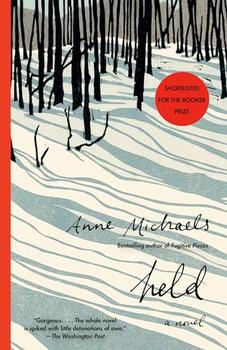Book Club Discussion Questions
In a book club? Subscribe to our Book Club Newsletter and get our best book club books of 2025!
For supplemental discussion material see our Beyond the Book article, Hertha Ayrton and our BookBrowse Review of Held.
Please be aware that this discussion guide will contain spoilers!
- Anne Michaels' background as a poet is a clear influence on Held, the language of which is spare, challenging and full of vivid imagery. The Booker judges said that 'few books can achieve a pitch of poetic intensity sustained across a whole novel'. How did Held's 'poetic intensity' affect your reading of the novel? Did it heighten the book's emotional impact?
- Held is structured unconventionally as a series of fragments, moving forwards and backwards in time, rather than as a traditional linear novel. Why do you think Michaels structured the book in this way? Could its fragmentary nature be seen as a more accurate representation of the way we experience and remember our lives than novels that follow a more conventional path?
- In an interview with the Booker Prizes, Michaels said, 'We measure history by events and actions, but this book wants to assert a different measure for history, the real and powerful effect of our inner lives – what we believe, what we value, what we love, what we aspire to'. To what extent would you say Michaels has succeeded in asserting this 'different measure'?
- Writing in the Guardian, Lucy Hughes-Hallett wrote that the individual stories in Held 'are told in glimpses. It is for the reader to join the dots.' Would you agree with this statement and how easy or difficult was it to fill in the often significant gaps in the narrative?
- The Booker judges said 'We loved the quietness of this book, and we surrendered to it.' Would you agree that Held is a 'quiet' novel, and to what extent is that a special or positive quality? Did you surrender to it, too?
- In the book, John and Helen run a photography business; Alan is a war photographer. Discuss the role that photography plays in the book and how it relates to the fact that Held is structured as a series of powerful and highly visual snapshots.
- The book contains supernatural elements, such as when the photographs developed by John show ghostly apparitions of the dead. In a book about love, grief and the effects of trauma, why do you think Michaels introduced these otherworldly elements that defy explanation, and how did they affect your reading of the book?
- Writing in The Conversation, Georgia Phillips wrote: 'At the centre of Held is the dichotomy between a scientific worldview and the more elusive forces that shape life.' Discuss the role that science plays in the novel, including the fact that real-life scientists – Ernest Rutherford and Marie Curie – appear as characters.
- Readers have speculated on the meaning of the book's title, and whether it refers to the physical act of holding or being Held by a loved one, or the experience of holding a person or image in one's memory, or even the way opposing forces are Held in balance. What does the title mean to you?
Reading guide reproduced from the
Booker Prize website.
Unless otherwise stated, this discussion guide is reprinted with the permission of Vintage.
Any page references refer to a USA edition of the book, usually the trade paperback version, and may vary in other editions.
